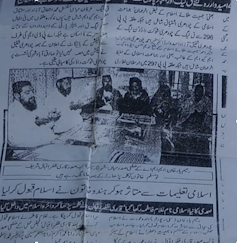‘Forced conversions’ of Hindu women to Islam in Pakistan: another perspective
By Dr. Jürgen Schaflechner who has been studying Pakistan’s small Hindu community for over ten years.
J.S, Author provided
Jürgen Schaflechner, University of Heidelberg
When I began to research the ritual journeys to the Hinglaj Devi shrine in Baluchistan, I knew little about the small Pakistani Hindu community. During my fieldwork, I had ample opportunities to talk to Pakistani Hindus about their faith and life in the Islamic Republic. In such talks I often heard of incidents in which Hindu girls disappear from their home or workplace and later resurface as converted and married Muslim women. I was told that religious zealots kidnap these girls from their homes and forcefully converted them to Islam.
Now, almost 10 years after I began following these incidents, I am struggling with this explanation. While I believe that some cases of forced conversion, in fact, involve religious zeal, it appears as if religion in many other instances often only surfaces ex post facto.
In other words, many conversions of Hindu women in Pakistan are harnessed as a means to an end and not necessarily the initial objective. This is particularly true for the rural Sindh where I collected most of case-studies.
A matter of male honour
Take the example of Kasturi, a girl from Tharparkar, who was allegedly kidnapped and raped by the son of a local influential landlord. After the case had become public, the landlord suggested to convert Kasturi to Islam and to marry her to one of his sons. Conversion in this case merely served as a way to conceal the sexual assault. A further example where religious zeal does not help us in understanding the situation is the case of Chandavati, a mother of two daughters, who was, according to her own statement, abducted and kept hostage for six months. To stop an investigation into her disappearance, Chandavati was converted to Islam and married to one of her kidnappers. Here is an interview with Chandavati only a short time after her escape:
In recent years, incidents of alleged forced conversion have increasingly polarized the Islamic Republic. Religious conversions, of course, have a long history in South Asia and, in fact, all over the globe. Cases of Hindu women willingly – or unwillingly – converting to Christianity or Islam have occupied colonial courts and have repeatedly served as disruptive moments for communal harmony. Then as well as today, such discourses reduce women’s suffering to a by-product of a crime which was ultimately inflicted by one male community on another male community.
It seems that notions of honour frequently form the basis of cases of forced conversion, and therefore, “men” often emerge as the apparent victims of such incidents – while the fate of the women involved remains secondary.
Taking women agency into account
Let’s look at the public discourse around forced marriage (Urd. jabri shadi) or forced conversion (Urd. jabran mazhab tabdili) in Pakistan (but also internationally). Here we frequently find one out of two possible explanations: first that Hindu women wish to embrace Islam due to its inherent attraction (put forward by the Muslim religious right).

J.S, Author provided
The second one emphasised by liberal Pakistani media and Hindu nationalists is that that Muslim predators aim to spread Islam through the forced conversion and marriage of minority women.
But nuanced explanations taking into account Hindu women’s agencies are difficult to find.
The case of Rinkle Kumari, a Hindu girl from Ghotki in northern Sindh, who vanished from her home in 2012 serves as an apt example. Even though her case gained significant public attention, it is still not completely clear why and how Rinkle disappeared. Rinkle gave a few public statements, these, however, were alternately interpreted as coerced by her kidnappers or pressurised by her family. Even though Rinkle talked publicly, her words had no impact on the male-dominated public discussion.
Engaging with Hindu patriarchal structures
Finally, if we wish to fully understand why these girls disappear, I believe it is crucial to engage with the Hindu community’s patriarchal structures. I believe that behind some cases of forced conversion we actually find a family’s attempt to avoid social stigma.
Rural parts of Sindh (but also other parts in Pakistan) are highly patriarchal and daughters who decide to marry a man of their own choice are frequently a reason for shame.
By labelling an eloped daughter as the victim of a crime, Hindu families avoid ridicule and embarrassment. I base this assumption on my lengthy collaboration with Hindu rights groups in Sindh as well as the study of affidavits taken from Sindhi newspapers (called Qassamu Namo in Sindhi).
Women commission such documents with the help of court clerks. These affidavits are published a few days after the girls have left their families and serve as proof that they had willingly eloped.
I believe that explaining cases of forced conversion with religious zeal, fails to see the complexities behind the economic, social, and political realities of many Pakistani-Hindu women.
This short essay shows the myriad ways in which non-Muslim women are commodified within Pakistan’s patriarchal society. Local influential elites, for example, might utilise religious sentiment as an insidious tool to cover up sexual harassment.
Rinkle’s conversion to Islam has shown how today’s mediatisation turned her body into a mute token of male honour, bereft of the ability to speak for herself. Finally, social workers in Sindh confirm that a portion of these incidents consist of women who willingly leave their homes to marry into Muslim families. Such incidents of female agency also need to be considered when dealing with cases of forced conversion.
The last word I would like to offer Kalpana Devi, a Hindu woman from Sindh and a human rights lawyer, who has been working on such cases for many years.
The video clips in this article have been taken from my 2016 film, “Thrust into Heaven”.![]()
Jürgen Schaflechner, Assistant professor, University of Heidelberg
This article is republished from The Conversation under a Creative Commons license. Read the original article.

